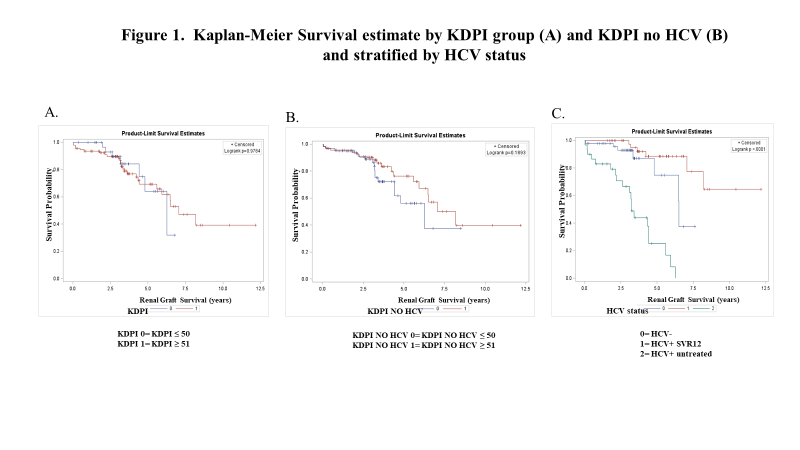Evaluating the Effect of HCV Status on the KDPI in the Era of DAA Therapy
1Institute of Human Virology, University of Maryland School of Medicine, Baltimore, MD, 2Institute of Human Virology, Baltimore, MD, 3University of Maryland Medical Center, University of Maryland School of Pharmacy, Baltimore, MD, 4Institue of Human Virology, University of Maryland School of Medicine, Baltimore, MD
Meeting: 2020 American Transplant Congress
Abstract number: A-050
Keywords: Graft failure, Hepatitis C, Kidney
Session Information
Session Name: Poster Session A: Kidney Deceased Donor Selection
Session Type: Poster Session
Date: Saturday, May 30, 2020
Session Time: 3:15pm-4:00pm
 Presentation Time: 3:30pm-4:00pm
Presentation Time: 3:30pm-4:00pm
Location: Virtual
*Purpose: The association between KDPI and kidney graft outcomes is limited in the era of DAA therapy.
*Methods: We analyzed adult renal transplants, at the University of Maryland Medical Center from 2008 to December 2017. We used Kaplan-Meyer and Cox multivariable models to investigate the association of KDPI or KDPI no HCV with graft failure. We used a stepwise variable selection method, forcing KDPI in the model, with criteria for inclusion being p= 0.05 and p=0.2 for backward elimination. This study was approved by the IRB (HP-00043154) as exempted human subject research.
*Results: 128 kidney transplant recipients were included in the study, with demographics shown in Table 1. 33 recipients had graft failure; 67% in HCV+ untreated recipients. The 6-year graft survival was similar when KDPI was analyzed with or without HCV (64% for KDPI<50 vs 62% for KDPI>51 and 56% in KDPI no HCV <50 vs 57% in KDPI no HCV >51, p=0.98 and p=0.19). The 6-year graft survival estimates of HCV+ recipients successfully treated with DAAs were higher than HCV- recipients, while HCV+ untreated recipients had poor graft survival (89%, 75% and 8.4% with p=0.0001) (Figure 1). Adjusting for recipient’s age, HCV status, induction and the KDPI*age interaction, a KDPI>51 was significantly associated with an increased hazard of graft failure (HR: 4.41, 95% CI: 1.3, 16.5; p=0.03), but removing HCV status reduced the hazard of graft failure, though not significantly (HR: 1.82, 95% CI: 0.6, 5.1; p=0.25) (Table 2). HCV status, induction, recipient age and the KDPI*age interaction were significant with KDPI as primary exposure, but the significance of the last 2 covariates was lost when HCV status was removed from KDPI.
*Conclusions: Recipients cured of HCV had similar graft survival as those without HCV. While we found no differences in the graft survival estimates between KDPI calculation methods, the hazard of graft failure reduced when HCV status was removed from KDPI, suggesting the KDPI calculation should be reevaluated in the era of DAAs.
To cite this abstract in AMA style:
Husson J, Curreli S, Ravichandran B, Wilson E. Evaluating the Effect of HCV Status on the KDPI in the Era of DAA Therapy [abstract]. Am J Transplant. 2020; 20 (suppl 3). https://atcmeetingabstracts.com/abstract/evaluating-the-effect-of-hcv-status-on-the-kdpi-in-the-era-of-daa-therapy/. Accessed July 18, 2025.« Back to 2020 American Transplant Congress

